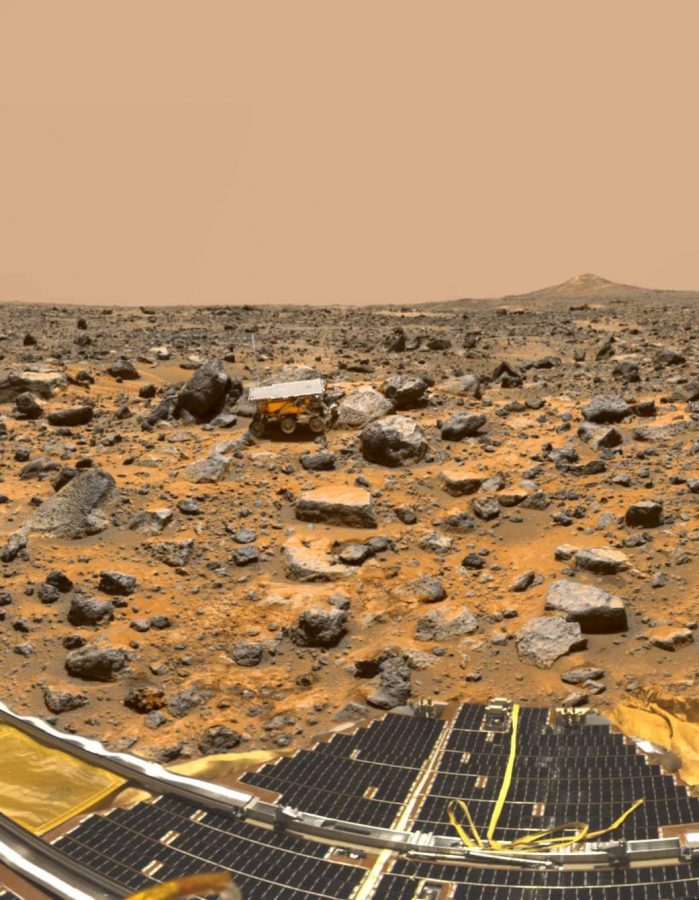People volunteer to rove on Mars
Morality comes into play as Mars One and NASA attempt to start civilization on Mars
photo via NASA/JPL under Creative Commons license
By 2025, NASA scientists plan on sending the first people on Mars.
When people start considering the 2000s as “ancient times,” they will most likely find it hard to believe that there was no such things as having the option of living on Mars. In a time span of 15 years, the nonprofit organization Mars One and NASA both plan on sending people to the planet. However, their ideas beg the question of whether the plans are ethical?
The dispute can reasonably make someone reconsider making a trip up to the red planet. According to an article in Cosmos Magazine, the risk is so apparent that a NASA committee made a list which included “hazards posed by space radiation, psycho-social issues, bone and muscle loss,” and the list goes on. Space is the ”harshest possible human environment, exceeding conditions anywhere on the planet.” Despite the controversies, several people are advocating the mission and companies have begun working on it.
Mars One, a non-profit organization that plans on being the first to send people to the red planet, has been making dramatic leaps in trying to make the dream a reality, and according to USA Today, they will be sending 100 applicants up in as soon as 2024.
Once you sign up and are chosen to go and live on Mars, there’s no coming back. According to a news article in USA Today, an MIT analysis said that people could start dying on Mars from “oxygen related issuers as early as 68 days.” The technologies needed to sustain life are still being developed. Maybe the reasons that people don’t have the option of leaving Mars is because they the know that by the time they get settled in, they won’t be alive.
According to Business Insider, on Aug. 13, two MIT students, Sydney Do and Andrew Owens, met with the founder of Mars One, Richard Branson, and pointed out all of the faults in the company’s plans. They don’t have “the required funding” or the technology to pull it off. According to Do and Owens, the program is “fundamentally unsustainable because the cost grows as the number of people living on Mars increases,” and that its “preliminary and needs further research and development.”
Even though they’re not fully prepared to make the mission, Mars One is still in a hurry to start civilization there. Though their dedication is admirable, their plan is flawed. Without the right equipment, sending people to the unknown is dangerous and immoral because there are too many risks.
NASA is also dead-set on being the first to make another giant leap for humanity, and thankfully, they will be able to bring you back to Earth once you’re there.
According to a news article Forbes, most of NASA’s work has been about developing the capability of making a “human round-trip voyage to Mars,” possible. The agency has been testing technology that will help make the trip possible.
In the 2020s, NASA plans on sending astronauts aboard the International Space Station in a low-earth orbit so that they can “prove many of the technologies and communications systems needed for human missions to deep space,” according to the agency’s website.
Already, according to a news article in USA Today, NASA has already begun preparing to send a crew to Mars in the 2030s, and so they’ve locked six people inside an “isolation dome” in Hawaii for a year, making it the longest experiment in the U.S.
It’s comforting to know that NASA has a plan, and they’re going through with it in the safest and most plausible ways possible. However, I have seen one too many episodes of “The Twilight Zone” to know that an isolation dome cannot end well.
Yes, living on Mars would be incredible, and I would love to be able to take a vacation there someday — many people would — but I’d only do it if the process was foolproof. Unlike Mars One, NASA has greater resources and a more solid plan, making them a more likely candidate in being the first to send people, but the question about ethics remains. Even if NASA finds a way to make the trip safe, there is a great psycho-social risk that comes with being in an isolated, uncivilized community. Life on Mars would be amazing, and it would be the perfect excuse to not show up to your high school reunion, but until the plan is solid and the people running it are confident, a trip to Mars may not be such a great idea.

INTERESTS/HOBBIES: knitting
EXTRACURRICULAR ACTIVITIES: I walk my dog everyday
THREE WORDS TO DESCRIBE ME ARE: umm ya ok
IN TWENTY...











